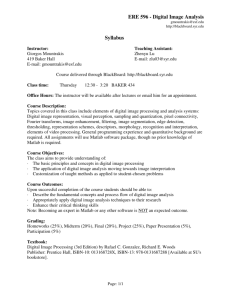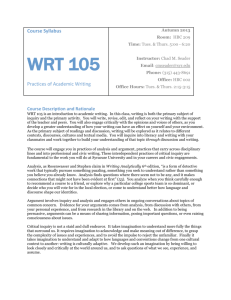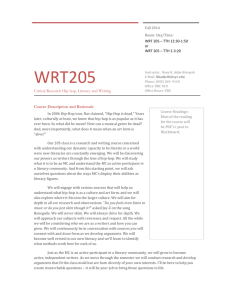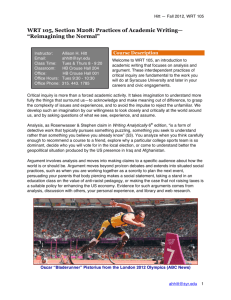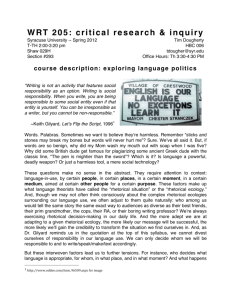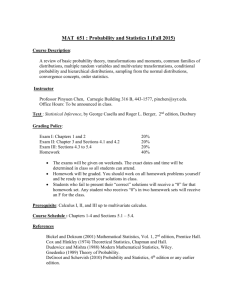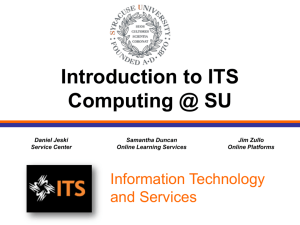Practices of Academic Writing Syracuse University
advertisement
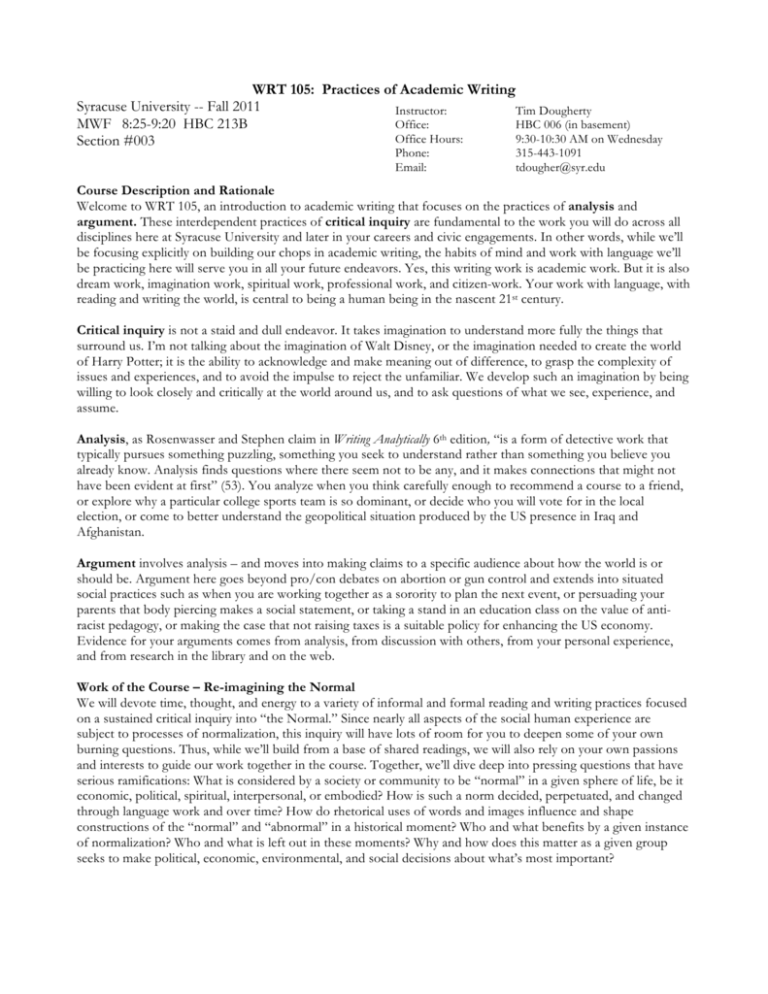
WRT 105: Practices of Academic Writing Syracuse University -- Fall 2011 Instructor: Tim Dougherty MWF 8:25-9:20 HBC 213B Office: HBC 006 (in basement) Office Hours: 9:30-10:30 AM on Wednesday Section #003 Phone: Email: 315-443-1091 tdougher@syr.edu Course Description and Rationale Welcome to WRT 105, an introduction to academic writing that focuses on the practices of analysis and argument. These interdependent practices of critical inquiry are fundamental to the work you will do across all disciplines here at Syracuse University and later in your careers and civic engagements. In other words, while we’ll be focusing explicitly on building our chops in academic writing, the habits of mind and work with language we’ll be practicing here will serve you in all your future endeavors. Yes, this writing work is academic work. But it is also dream work, imagination work, spiritual work, professional work, and citizen-work. Your work with language, with reading and writing the world, is central to being a human being in the nascent 21st century. Critical inquiry is not a staid and dull endeavor. It takes imagination to understand more fully the things that surround us. I’m not talking about the imagination of Walt Disney, or the imagination needed to create the world of Harry Potter; it is the ability to acknowledge and make meaning out of difference, to grasp the complexity of issues and experiences, and to avoid the impulse to reject the unfamiliar. We develop such an imagination by being willing to look closely and critically at the world around us, and to ask questions of what we see, experience, and assume. Analysis, as Rosenwasser and Stephen claim in Writing Analytically 6th edition, “is a form of detective work that typically pursues something puzzling, something you seek to understand rather than something you believe you already know. Analysis finds questions where there seem not to be any, and it makes connections that might not have been evident at first” (53). You analyze when you think carefully enough to recommend a course to a friend, or explore why a particular college sports team is so dominant, or decide who you will vote for in the local election, or come to better understand the geopolitical situation produced by the US presence in Iraq and Afghanistan. Argument involves analysis – and moves into making claims to a specific audience about how the world is or should be. Argument here goes beyond pro/con debates on abortion or gun control and extends into situated social practices such as when you are working together as a sorority to plan the next event, or persuading your parents that body piercing makes a social statement, or taking a stand in an education class on the value of antiracist pedagogy, or making the case that not raising taxes is a suitable policy for enhancing the US economy. Evidence for your arguments comes from analysis, from discussion with others, from your personal experience, and from research in the library and on the web. Work of the Course – Re-imagining the Normal We will devote time, thought, and energy to a variety of informal and formal reading and writing practices focused on a sustained critical inquiry into “the Normal.” Since nearly all aspects of the social human experience are subject to processes of normalization, this inquiry will have lots of room for you to deepen some of your own burning questions. Thus, while we’ll build from a base of shared readings, we will also rely on your own passions and interests to guide our work together in the course. Together, we’ll dive deep into pressing questions that have serious ramifications: What is considered by a society or community to be “normal” in a given sphere of life, be it economic, political, spiritual, interpersonal, or embodied? How is such a norm decided, perpetuated, and changed through language work and over time? How do rhetorical uses of words and images influence and shape constructions of the “normal” and “abnormal” in a historical moment? Who and what benefits by a given instance of normalization? Who and what is left out in these moments? Why and how does this matter as a given group seeks to make political, economic, environmental, and social decisions about what’s most important? 2 During the course you might be asked to annotate readings, keep a record of ideas and responses, jot down observations, take notes on class discussions, experiment with different styles and organizational choices, and engage in a variety of drafting and revision activities. All these activities are important and will have an impact on your development and success as academic writers (and your final grade). As you will see in the grade breakdown below, 20% of your final grade comes from invention work and reflection, work which I will collect on a regular basis and grade on a check, check +, check – scale. You will get a zero for work you do not complete or that you don’t submit on time. Writing well depends upon reading well. The course texts will provide you with ideas and arguments, facts and statistics. They will prompt thought as you agree or disagree or qualify those ideas. They enlarge the context for our class discussion. And they illustrate choices other writers have made as they composed. Writing and reading are interdependent practices, and you will move between the two regularly throughout the course. Course Goals for WRT 105 1. By engaging with issues of diversity and community and considering issues of power and difference that shape every rhetorical act, students will compose texts that are ethically responsive to different perspectives. 7. Students will explore how various genres and writing technologies affect rhetorical reception, production, and circulation and will develop abilities to understand genre and technology as responsive to rhetorical context. 2. Students will practice critical techniques of reading and will compose texts that draw on the ideas, positions, and voices of others. 8. Students will develop an understanding of generic conventions and will compose essays that encompass a variety of genres, including analysis, argument, and synthesis. 3. Students will practice analysis in all areas of writing, reading and research: from topic invention, to source evaluation, to deepening their understanding of issues. 9. Students will assess the reliability of sources and will summarize, synthesize, and integrate source materials into their writing. 4. Students will develop knowledge of basic rhetorical principles and the ability to draw upon those concepts as observers, readers, writers, and citizens. 10. Students will learn and enact rhetorical and ethical source use, including proficiency using MLA/APA citation conventions. 5. Students will develop varied invention strategies, such as drafting, brainstorming, observing, and researching. 11. Students will develop revision and editing strategies for organization, prose style, and technical control. 6. Students will develop an awareness of the role of research in invention and argument and a working knowledge of introductory research methods, such as primary research and use of library resources. Course Texts and Materials Himley, Margaret & Anne Fitzsimmons, Critical Encounters with Texts: Finding a Place to Stand, 7th ed. Wysocki, Anne & Dennis Lynch The DK Handbook Rosenwasser, David and Jill Stephen. Writing Analytically, 6th ed. (Texts are available at both the University Bookstore and Follett’s Orange Bookstore. Critical Encounters and The DK Handbook should be purchased as a packet.) You should also be prepared to provide copies of your work for everyone in the class (or in your peer response group) at various times during the semester. These can be xerox copies (CNY Printing and Copy Services in Marshall Square Mall, Alteracts, and the library offer low cost, self-service copying) or additional copies printed out from your computer. Plan on spending as much as $10 over the course of the semester. Feedback You will receive many different kinds of feedback during this course. Some will come from fellow students and some will come from me. Both are important; they tell you in various ways how your readers are responding to your writing. This feedback will also help you learn how to assess your own work. 3 Grading The breakdown is as follows: Unit 1: jumpstart essay Unit 2: analysis essay Unit 3: argument essay Course invention work and reflections 10% 35% 35% 20% Attendance and Participation Writing studios are courses in language learning, and language is learned in communities; therefore, it is essential that you attend class and participate. Absences and lack of preparation for class will affect your classmates' work as well as your own. The work you do in class, the work you do to prepare for each class, is as important as any polished assignment you turn in for a grade. In addition, each unit calendar is only a projection and may be subject to occasional changes and revisions as it seems appropriate, necessary, or just interesting. That is another reason why your attendance is vital. If you must miss a class, you are responsible for work assigned. Please realize, however, that class time cannot be reconstructed or made up, and that your performance, your work, and your final course grade will be affected by absences. If you miss the equivalent of three weeks of classes or more without any official documented excuse it is unlikely you will pass the course. I don’t anticipate any of you will be in that position, however, so let’s all agree to do the work, come to class, learn a lot, and make the course a meaningful experience. Blackboard Our course is loaded on blackboard, a University on-line teaching support system. I will teach you how to access our section of WRT 105 on blackboard, and will then expect you to be able to locate, download, and link to a range of course materials with some regularity throughout the semester. I will also contact you regularly via the blackboard course listserv, which has already been created using each student’s “syr” email address. Please check your syr account at least once daily throughout the fall. The url for blackboard is: http://blackboard.syr.edu Once you access the main page you will be asked for your user ID and password. The following is from the student help page of blackboard: Once a student registers for a course that is using Blackboard, a student account is set up for them and they are automatically enrolled in the appropriate course(s). Users login to Blackboard using their NetID and password. Your NetID is the portion of your SU email that appears before the @syr.edu. Your NetID password is also your Blackboard password. If you do not know what your NetID and password are, visit the ITS website at http://its.syr.edu/netid/to obtain this information. You can also obtain this information by calling 443-2677, or by going to the Student Computing Support Center in your dormitory. Special Needs and Situations If you believe that you need accommodations for a disability, please contact the Office of Disability Services (ODS), http://disabilityservices.syr.edu, located in Room 309 of 804 University Avenue, or call (315) 443-4498 for an appointment to discuss your needs and the process for requesting accommodations. ODS is responsible for coordinating disability-related accommodations and will issue students with documented disabilities Accommodation Authorization Letters, as appropriate. Since accommodations may require early planning and generally are not provided retroactively, please contact ODS as soon as possible. Syracuse University and I are committed to your success and to supporting Section 504 of the Rehabilitation Act of 1973. This means that in general no individual who is otherwise qualified shall be excluded from participation in, be denied benefits of, or be subjected to discrimination under any program or activity, solely by reason of having a disability. You are also welcome to contact me privately to discuss your academic needs although I cannot arrange for disabilityrelated accommodations. 4 Religious Observances SU’s religious observances policy, found at http://supolicies.syr.edu/emp_ben/religious_observance.htm, recognizes the diversity of faiths represented among the campus community and protects the rights of students, faculty, and staff to observe religious holy days according to their tradition. Under the policy, students are provided an opportunity to make up any examination, study, or work requirements that may be missed due to a religious observance provided they notify their instructors before the end of the second week of classes. For fall and spring semesters, an online notification process is available through MySlice/Student Services/Enrollment/My Religious Observances from the first day of class until the end of the second week of class. If this applies to you, please follow proper university procedures, as I will be unable to honor requests that don’t follow this policy. Missed work will be due in class the first day that you return. Use of Student Writing It is understood that registration for and continued enrollment in this course constitutes permission by the student for the instructor to use any student work constructed as a result of said enrollment in the course. Technology Use Most of the work you do for this class will be handed in word-processed. Final drafts will be turned in electronically via Blackboard. Use an easily readable font, size 12 point. Include one-inch margins and follow the page layout used by the MLA format described in your handbook. I prefer email for contact outside class, and will often send announcements to class via your “syr.edu” account. Use email to contact me about your coursework, to set up an appointment to meet with me outside class, or to ask a question. We will be looking at a variety of sites on the Internet at times during the course. Please let me know if you have not had any experience using a browser such as Firefox, Netscape or Explorer, and we can get you up and running. While computers save us great amounts of time over typewriters and make corrections much simpler, they are also susceptible to crashing and freezing. Save your work frequently, always make backup copies, and plan your projects with extra time allowed for those inevitable glitches. The Writing Center Experienced writing consultants at the Writing Center (101 HB Crouse Hall, on the Quad) can teach you how to succeed on individual assignments and ultimately become a better writer. They’re prepared to work one-on-one with you at any stage of your process and with any kind of writing you’re attempting while attending SU. Whether you need help understanding an assignment, brainstorming ideas, revising subsequent drafts, or developing editing strategies, face-to-face and online appointments are available for 25- or 50-minute sessions throughout the semester and can be reserved up to seven days in advance via their online scheduling program, WCOnline. In addition, drop-in appointments are welcome Monday through Thursday from 10:00 a.m. to 2:00 p.m. and brief concerns or questions can be emailed to consultants via the eWC. For more information on hours, location and services, please visit http://wc.syr.edu. This is a free resource to all students and highly recommended for every assignment you work on in this class. Academic Integrity All writing submitted for this course is understood to be your original work. In cases where academic dishonesty is detected (the fraudulent submission of another's work, in whole or part, as your own), you may be subject to a failing grade for the project or the course, and in the worst case, to academic probation or expulsion. For a more detailed description of the guidelines for adhering to academic integrity in the College of Arts and Sciences, go to: http://academicintegrity.syr.edu
